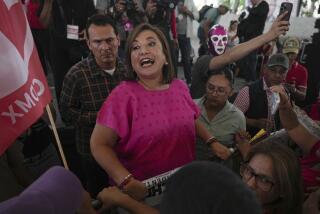Our Burden in Philippines Is Big--No Matter What
- Share via
The presidential election campaign in the Philippines is an episode in a complex political and social drama that could have widespread international repercussions. Whatever the result of the election, the United States will continue to face problems in the Philippines and will have to make a number of serious, costly and possibly painful policy decisions in the years ahead.
There are several reasons for our national involvement. First, there is the fact that the Philippines is the only sovereign nation that was once a colony of the United States, and we have to bear some responsibility for the sort of nation that it has become. Second, there is the fact that the Philippines is an ally of the United States, and we are bound to have an interest in its national welfare. Third, there is the fact that we are a nation on the Pacific Rim, and we have an interest in maintaining the peaceful and prosperous equilibrium that currently exists in the Pacific--an equilibrium that has been achieved at enormous cost in lives and treasure expended in three major military conflicts to which we have been a party; our military bases in the Philippines are an important part of that equilibrium.
The worst-case scenario for the Philippines would be a civil war. We must use our influence to avoid such a war--not only because of the brutal suffering that it would cause to a friendly people who deserve a better fate, but also because civil wars have a tendency to act as vortices that draw in outside powers. External interference in a Philippine civil war, especially by the Soviets or a Soviet acolyte, would risk the prospect of U.S. involvement.
This presidential election is important, therefore, if it is carried out cleanly and won honestly, because it will give the Filipino people an opportunity to express themselves democratically and to arrest the drift toward polarization of the society that has given rise to the concerns about civil war. However, even if the voting is generally perceived to be fairly conducted and the results are accurately tabulated, much will remain to be done before the damage of the past several years can be repaired.
Most sophisticated observers of the Philippines believe that Ferdinand E. Marcos will be reelected on Feb. 7. They know that he has control of most of the levers of power and patronage, and has developed a very effective political machine over the past 20 years. It is this perception that accounts for much of the concern being expressed in both the executive and congressional branches of our government about how to cope with the problems of cronyism, corruption, the need for military reform and the allegations of illegal capital export in a new Marcos administration that would be apparently anointed and sanctioned by a certifiably democratic process. This circumstance would confront the Reagan Administration with challenges more complicated than those previously presented by the shah, Somoza or the Greek colonels in other political eras.
On the other hand, a victory by Corazon C. Aquino would not be a simple panacea, either, but would present Washington with a different set of problems. First, it would be important that her victory should not result merely in the accession of a new set of cronies to replace the Marcos group--a “change of oligarchs,” as the Filipinos say. Next, it would be essential that the inevitable military reform be conducted in such a way that the armed forces would not split, with the powerful Ilocano faction attempting a pro-Marcos coup. Finally, it would be a major problem to attract honest, competent senior officials to work for a president who, by her own admission, has no political experience.
If Aquino should win, presumably she could count on significant assistance in meeting these problems from much of the Filipino business community, from the senior hierarchy of the Roman Catholic Church and from the professional cadres of the armed forces. But this aid would not be enough. She would require external help as well--especially from the United States and Japan.
The fundamental political and social problems of the Philippines cannot be cured until there is a vast economic improvement. This would involve not only a significant increase in economic activity but also a more equitable distribution of income and a more responsible contribution by the wealthy Filipino minority to the national well-being.
Very few additional economic resources can be generated in the Philippines under current circumstances. An improvement at economic levels would mean an increase in assets from abroad, either as investment or as loans. The Philippines already owes about $35 billion--$27 billion of it to commercial banks in the United States, Japan and Europe. It cannot earn enough now to service those loans and to pay for more.
Therefore, an Aquino victory in the age of Gramm-Rudman and the Latin American debt crisis would add new burdens to bear if new disasters are to be avoided.
More to Read
Sign up for Essential California
The most important California stories and recommendations in your inbox every morning.
You may occasionally receive promotional content from the Los Angeles Times.













